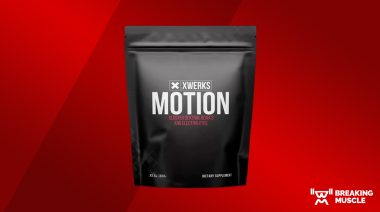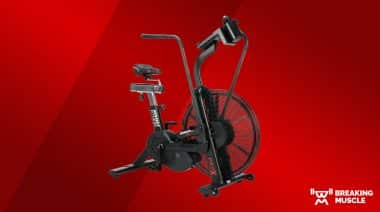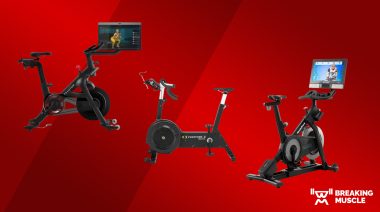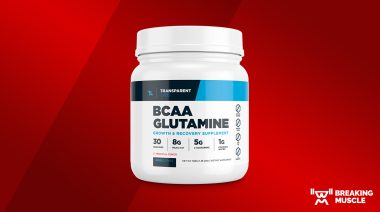What does the contributing editor of Popular Mechanics, who also holds a PhD in physics, have to say about fitness? Well, in an attempt to set the record straight and dispel many of the myths in and around fitness, author and scientist Alex Hutchinson wrote his latest book, Which Comes First, Cardio Or Weights? The book is chock-full of interesting questions that are then answered by data from the most recent scientific studies. Many of the hotly contested debates you see around the Internet related to exercise and nutrition are covered.
These are some of the questions covered in Hutchinson’s book:
- Should I exercise when I’m sick?
- Do I need strength training if I just want to be lean and fit?
- What role does my brain play in fatigue?
- Will running barefoothelp me avoid injuries?
- To lose weight, is it better to eat less or exercise more?
- How should I adapt my workout routine as I get older?
- Does it matter what I’m thinking about when I train?
- Will drinking coffee help or hinder my performance?
- Should I have sex the night before a competition?
- Is there such thing as a “runner’s high?“
As to the title of the book and the question at hand (cardio versus weights), like many of the questions covered in this book, there often isn’t a simple or definitive answer. I work for a company that does a group exercise workout that includes both a cardiovascular workout and a weight workout in one hour. Clients can choose whether they wish to do their cardio first or start in the weight room. What’s interesting is that in the year and a half I have worked there, I have come to see that people typically prefer to do their cardio first. By my own estimation, at least two out of three people start with cardio if they are given the choice, which begs the obvious question – why? Is there a benefit to doing cardio first?
According to Hutchison and the studies he references, the answer is, it depends. It turns out that our bodies have a “master switch,” an enzyme called AMP kinase, that controls adaptations for better endurance or strength. Depending on how you start your workout, you’ll either get better results with your strength or the benefits from an improved cardiovascular workout. But you can’t have it both ways – the switch is set to either bigger muscles or better endurance, not both. Hutchinson’s suggestion is to switch it up and get the best of both worlds.
All of us seek to make our workouts as efficient as possible and get the biggest bang for our buck. In this day and age, time is money, and time these days time is seemingly harder to come by. Efficiency reigns supreme as we are connected to our jobs and social networks at all hours of the day. If there is time for fitness, it has to be efficient. With that in mind, fitness customers show up to the gym not just expecting a good workout but also wanting answers to their questions. How much time do I need to workout to get thin? Should I run or do the elliptical? How much time should I spend in the “fat-burning” aerobic zone versus the anaerobic zone? If you have questions such as these, I recommend Hutchinson’s book.
That said, don’t expect clear-cut answers. The reality is that when it comes to fitness, there is a lot of conflicting data out there and a lot of incomplete data, as well. People also can also fall into the conventional wisdom trap, or they fall prey to tidbits they have picked up from savvy marketing. Recently, as a client was finishing her cardiovascular workout, we were discussing the training zones she had just exercised in. She asked, “The aerobic zone burns more fat, right?” This question is just one example of the many common misperceptions that people have when it comes to science and fitness. There is a lot of misjudgment, inaccurate information, or missing data when it comes to the conclusions we make on how to approach our fitness.
And even when we get our training advice from an “expert,” it is often not backed up with hard science. As trained as your doctor is, it’s my bet he or she didn’t study exercise physiology. Most medical schools don’t require nutrition, either. Even your fitness professional may or may not be an “expert,” as degrees, certifications, and practical experience vary widely. My advice: do your due diligence, and stick to the science. This book by Alex Hutchinson will help you do just that.
Listed below are some interesting tidbits from the book and food for thought. I do recommend the book and found it to be a quick and insightful read. However, if you simply want the CliffsNotes version, here’s a sneak peek:
- Worried about exercise being dangerous? Don’t be. For every million hours of aerobic exercise, approximately two deaths occur. It’s much more dangerous not to exercise.
- There isn’t an exercise gene. While genes may strongly influence things like athletic ability, you don’t need a certain set of genes to get in tiptop shape. Studies show that when it comes to results from exercise, more than 80% of the differences among us are environmental, not genetic.
- The link between running barefoot and injury is unclear. No conclusive evidence suggests it’s better (or worse) to run barefoot as it relates to injury.
- Increasing evidence suggests that fatigue is a function of subconscious processes in the brain versus a failure of your muscles, heart, or lungs. Furthermore, moderate exercise boosts your immune system, while intense exercise can temporarily suppress it.
- No matter how heavy the weight, or how many reps and sets you do, the most important factor in building muscle is achieving muscle failure by the final rep. Also, if your goal is “toning,” using a weight less than 40-50% of your one rep max (which many novice exercisers do) accomplishes little to nothing.
- Beginning in your mid-thirties you lose roughly 1-2% of your muscle mass each year, and your endurance capacity diminishes by about 9% per decade. Additionally, endurance declines more sharply than speed as we age. Studies show that regular exercise slows these declines dramatically.
- Training in a group causes the release of endorphins, which can lead to pleasure as well as better performance. Additionally, prolonged exercise can also release endorphins and create a “runner’s high.” Aerobic exercise also makes you smarter and improves your memory. Furthermore, aerobic exercise is better than strength when it comes to these mind body benefits.
- Lastly, the harder the better.
“Which Comes First, Cardio or Weights?” is available for $10.70 at Amazon.com.






